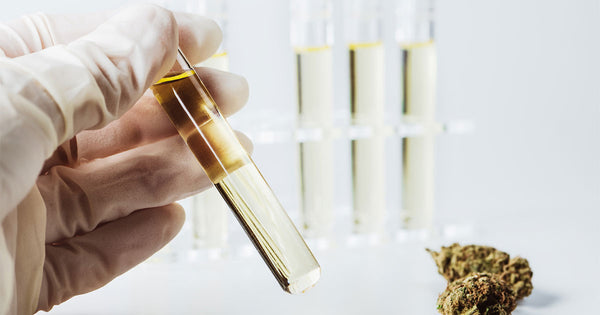PHO vs BHO Extraction: How to Produce Better Cannabis Concentrate
Oct 22, 2021

In the world of cannabis extracts, there are a variety of methods processors can use to strip the cannabinoids and terpenes from the rest of the cannabis plant material to produce a potent and pure concentrate. For commercial extraction, extraction technicians use a variety of solvents to process large volumes of high-potency oil.
Some of the most popular and effective solvents used in cannabis extraction are light hydrocarbons: butane and propane. Each solvent has its pros and cons but both can produce a high-quality concentrate. Our PHO vs BHO guide covers the difference between each extraction process and why a solvent blend can create a better concentrate.
What Is Butane Hash Oil (BHO)?

Butane hash oil (BHO) extraction is one of the most popular and most efficient processing methods in the cannabis extraction sector. Using butane as a solvent, processors can create a wide range of concentrate consistencies including shatter, wax, crumble, budder,, terp sauce, diamonds & sauce,, and sugar.
BHO extraction is generally performed in a laboratory environment featuring gas detection systems, proper ventilation, and other safety measures to reduce the risk of fire or an explosion from the volatile hydrocarbons. Butane is an extremely flammable and explosive solvent, which can be dangerous if used outside of a closed-loop extraction system (i.e. open blasting).
During the extraction process, the solvent is washed over the raw cannabis material (flower or trim) to remove the cannabinoids and terpenes from the cannabis plant matter. The cannabis concentrate is purged of the residual solvent in a vacuum oven. Each state has varying cut-off points and testing requirements for residual solvents, which can be harmful if consumed.
Overall, BHO extracts are safe to use and can actually contain a more complete spectrum of cannabinoids, terpenes, and flavonoids over other processing methods. For medical users, a full-spectrum product can produce amplified relief with reduced side effects due to the entourage effect.
Pros of Butane Extraction
- Ability to create full-spectrum extracts featuring a complete chemical profile
- Quick and efficient throughput compared to other extraction methods
- Requires minimal post-processing
- Ability to produce a wide range of butane hash oil products
Cons of Butane Extraction
- Higher boiling point than propane
- Can be extremely dangerous if not taken care of properly
- May lose out on some terpenes throughout the process compared to propane
- May require a mix of propane to increase terpene yield and optimize purging process
- May be more expensive than propane
- Higher affinity towards fat/lipids
What Is Propane Hash Oil (PHO)?

Propane hash oil (PHO) extraction is another efficient but less common extraction method that harnesses the power of propane to separate the cannabinoids and terpenes from the biomass. Generally, the PHO extraction process is conducted at lower temperatures and higher pressures compared to BHO extraction. The process can reduce the undesirable plant matter compounds in the final product.
Similar to the BHO extraction, propane hash oil (PHO) extraction is performed with closed-loop equipment. The solvent is passed over the cannabis material to remove the therapeutic compounds such as THC and CBD. Then, the concentrate undergoes a post-processing purge to remove the leftover solvent.
Propane has a lower boiling point than butane, allowing processors to use slightly lower temperatures during the propane hash oil extraction and purging process. As a result, the process can preserve more of the temperature-sensitive terpenes producing a more flavorful and aromatic concentrate, often bright yellow in color. Generally, this method produces a creamier, oilier, and softer consistency extract compared to the variety in consistencies of butane extractions.
Pros of Propane Extraction
- Lower boiling point than butane
- Extraction occurs under higher pressures
- Ability to preserve higher terpene concentration, creating high-terpene full-spectrum extracts with a sugar-like consistency
- Residual solvent is easier to remove during the purging process
- Propane can be more affordable than butane
Cons of Propane Extraction
- Not as versatile in creating a wide range of marijuana products
- Usually produces a consistency similar to budder, rendering it a one-note solvent
- Not much of a savings on price on a small scale and can be more expensive in some cases
Which Solvent Is the Best for Cannabis Extraction?
Which solvent is better for extracting marijuana compounds and creating high quality extracts? Is PHO wax or BHO wax the best? It depends. Ultimately, the type of solvent used will depend on the desired end product. In addition, it can depend on the type of closed-loop extraction equipment on-hand, which varies in efficiency and price. All in all, both propane and butane can produce a great cannabis extract.
The Best of Both Worlds: A Butane and Propane Blend

In today's marijuana extraction market, some processors are seeing the benefits of using a blend of butane and propane solvent to improve the efficiency and yield of their extractions and create a wider range of consistencies. Using both propane and butane can help preserve more of the terpenes in the marijuana extract while ensuring manufacturers obtain a sizable yield.
Many processors use a blend of 70% butane and 30% propane to create shatter and budder concentrates. The result is a more complete aromatic profile, lighter color, and lower viscosity compared to cannabis concentrates made only using butane.
When manufacturers use butane and propane, they must consider a variety of factors throughout the extraction and refining process:
Temperature and Pressure
When using a propane or solvent blend, processors will need to consider the difference in pressure and temperatures needed. Since butane's boiling point is 30.2º F, extraction technicians are better able to control the amount of vapor pressure needed since reaching that temperature is doable with a less cooling power. Since propane's boiling point is -43.6º F, processors need higher vapor pressure and cooling capabilities to reach the sub-zero temperatures.
Solvent Recovery
Propane's low boiling point allows manufacturers to purge the solvent with very low energy required. The result is a quicker recovery time for propane hash oil extractions compared to BHO extractions. Keep in mind, when blending solvents, the recovery time is not changed. The recovery process is ultimately dependent on the solvent with the slowest recovery time, which is butane.
Post-Processing
During post-processing, the use of propane can lead to a quicker and better purge of residual solvent in the vacuum oven due to the low heat needed to boil off propane in PHO wax. In addition, the use of propane can result in a higher yield of terpenes (higher propane ratio results in higher terpene concentration in PHO wax), creating a consistency that is more syrupy since terpenes have a lower viscosity than cannabinoids.
Finding the Perfect Ratio of Butane and Propane
Finding the perfect blend of hydrocarbons for a specific end product can be the difference between creating a flavorful and potent product and one that has an excessive percentage of terpenes. When the process becomes too efficient at removing terpenes, these can cause irritation in the throat and lead to a bad user experience. For this reason, it is important to find the right blend of solvents, as well as the right temperatures and pressures.
Improve Color and Clarity with Media Bros
Light hydrocarbon extractions (PHO and BHO extractions) can produce high-terpene full-spectrum extracts with high-quality starting material. Whether you have got aged biomass or simply want to improve the color and clarity to produce connoisseur-grade concentrates, Media Bros’ line of filter media can be the solution you need to produce better PHO and BHO wax.
Our CRX and CRY color remediation filter media can significantly improve the color and clarity of any quality oil. Reach out to request a free sample and see the difference for yourself.






